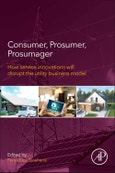Consumers, Prosumers, Prosumagers: How Service Innovations will Disrupt the Utility Business Model examines customer stratification in the electric power sector, arguing that it is poised to become one of the fundamental drivers of the 21st century power network as distributed energy generation, storage, sharing and trading options become available at scale. The book addresses the interface and the relationship between key players and their impacts on incumbent and disruptive service providers. Topics covered include innovations that lead to consumer stratification, regulatory policy, the potential of service, the speed and spread of stratification, and a review of potential business models and strategies.
The work also covers the evolution and potential end-states of electricity service provision, from its basis in current pilot programs as distributed generation scales and its potential to supplant industry norms.
Please Note: This is an On Demand product, delivery may take up to 11 working days after payment has been received.
Table of Contents
Part 1 How service innovations are leading to consumer stratification 1. Digitalization of energy M. Brown, S. Woodhouse, Pöyry Mgt. Consulting & F. Sioshansi, Menlo Energy Economics 2. Peer-to-Peer Trading and Blockchains: Enabling Regional Energy Markets and Platforms for Energy Transactions D. Shipworth, UCL, C. Burger, J. Weinmann, ESMT & F. Sioshansi, Menlo Energy Economics 3. Integrated energy services, distribute load aggregation and intelligent storage J. Baak, Stem & F. Sioshansi, Menlo Energy Economics 4. Service innovation and disruption in the Australian contestable retail market S. Bashir, Nexa Advisory, A. Smits & T. Nelson, AGL, Australia 5. Do I have a deal for you? Buying well in Australia's contestable retail electricity markets B. Mountain, Victoria Univ. Melbourne, Australia 6. Platforms to support non-wire alternatives and DSO flexibility trading R. Stanley, J. Johnston, Piclo and F. Sioshansi, Menlo Energy Economics 7. Consumer-centric service innovations in an era of self-selecting customers E. Gui & I. MacGill, UNSW, Sydney, AustraliaPart 2 How regulatory policy will impact the evolution of services 8. Fair, equitable, and efficient tariffs in the presence of distributed energy resources S. Burger, I. Schneider, A. Botterud and I. Pérez-Arriaga, MIT 9. New distribution network charges for new integrated network services I. Abdelmotteleb, T. Gomez and J. Pablo Chaves Avila, Comillas Pontifical Univ. Madrid, Spain 10. Community energy storage: Governance and business models B. Koirala, Univ. of Twente, R. Hakvoort, TU Delft, E. van Oost, Univ. of Twente & H. van der Windt, Univ. of Groningen, The Netherlands 11. Challenges to the promotion of distributed energy resources in Latin America: A Brazilian case study L. Noura Guimarães, Madrona Law firm, São Paulo, Brazil
Part 3 Impact of new business models on distribution companies 12. The future of electricity distribution: A California case study F. Sioshansi, Menlo Energy Economics 13. Using flexibility resources to optimize distribution grids? A French case study P. Germain and E. Jan, E-CUBE Strategy Consultants, Paris, France 14. Off-grid Prosumers: Electrifying the next billion with PAYGO solar T. Couture, E3 Analytics, S. Pelz, C. Cader and P. Blechinger, RLI, Berlin 15. Customer stratification and different concepts of decentralization D. Bauknecht, J. Bracker, F. Flachsbarth, C. Heinemann, D. Seebach and M. Vogel, Oeko Institute, Germany 16. Designing markets for innovative electricity services in the EU: The roles of policy, technology, and utility capabilities G. Ivan Pereira, Univ. of Coimbra, MIT, P. Pereira da Silva, Univ. of Coimbra & D. Soule, MIT 17. How incumbents are adjusting to the changing business environment: A German case study F. Weiss, R. GroB, S. Linowski, C. von Hirschhausen, B. Wealer and T. Zimmermann, TU Berlin 18. Who will fuel your electric vehicle of the future? You or your utility? J. Webb, QUT, J. Whitehead, Univ. QLD and C. Wilson, QUT 19. Distributed energy resources in the US wholesale markets: Recent trends, new models and forecasts U. Helman, Helman Analytics








